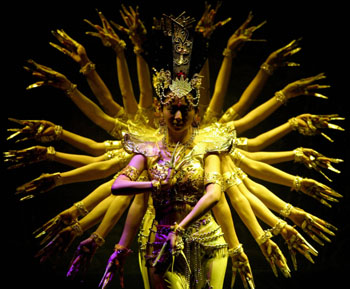| Tools: Save | Print | E-mail | Most Read |
| China Questions and Answers |
| Adjust font size: |
Q: Disabled people are a disadvantaged group in society. Are the handicapped in China discriminated against by society? What measures has the government taken to safeguard their legitimate rights and help them take part in social activities as equals? A: In May 2005, during the Fortune Global Forum in Beijing, the audience was charmed by the dance "Thousand-Handed Guanyin" performed by a dozen deaf and mute girls from the China Disabled People's Performing Art Troupe. This dance is China's only program that has been presented in two magnificent halls of art, in the United States and Italy. This somewhat reflects the Chinese disabled persons' living status quo. China is a developing country with the largest population of disabled people. With 60 million in number, they make up 5 percent of the country's total population. The Chinese Government attaches great importance to work related to persons with disabilities. In December 1990, such laws and regulations as the Law on the Protection of Disabled Persons, Regulations on the Education of Persons With Disabilities, and the Regulations on Labor and Employment of Persons With Disabilities were formulated and promulgated. By implementing national programs, China has brought into full play the role of various social forces to provide more equal opportunities for the disabled persons, so they can join social activities and share social achievements equally with their fellow citizens. China's compulsory education system has taken into consideration the education of disabled children. At present, there are 1,665 special education schools for children with mental and physical deficiencies and in regular schools there are 3,154 special education classes for disabled children. As a result, the enrollment of disabled children continues to rise. What's more, in 2004, 4,112 disabled students entered institutions of higher learning for advanced studies. The employment of persons with disabilities is also ensured. According to statistics, a total of 1.09 million disabled people now work in urban entities specially set up for them and a variety of social departments have accepted 1.24 million in accordance with certain proportions. Another 1.7 million work on their own account or find employment in entities organized by themselves of their own accord. In rural areas, 16.24 million handicapped people are engaged in crop farming, aquaculture and cottage industries, with an employment rate of 80 percent. Moreover, China has continued to improve the social rehabilitation service system, to help the disabled people improve their health. In 2004, more than 3.3 million disabled people overcame their disabilities to varying degrees. In terms of social security, a large number of persons with disabilities have benefited from the minimum living standard program. In some places, persons with different degrees of disabilities receive different kinds of aid. Those with serious physical or mental disabilities and those families with more than one handicapped member are given special assistance. Consequently, they can enjoy better social security services. In some urban areas, impoverished disabled people who are self-employed are entitled to subsidies for participating in basic old-age insurance schemes. China's handicapped people are now enjoying an increasingly good mental and physical culture, as cultural institutions, libraries and gyms are providing more and more services for them. The China Disabled People's Performing Art Troupe presented excellent programs to audiences in seven countries, including Switzerland and Turkey, which shows the world the artistic talents and strong will of Chinese disabled people. In the 12th Paralympics in Athens, the Chinese delegation ranked first in terms of both gold medals and overall medals. China has endeavored to develop a good social environment in which the disabled people can receive help and care. In 1991, the third Sunday of May was designated as the National Help-the-Disabled Day, and on each year's occasion ever since, various activities dedicated to helping the disabled would be staged throughout the country. In large and medium-sized cities, and in major streets as well as shopping centers, hospitals, hotels, cinemas, museums, airports and train stations, a variety of wheelchair ramps, special ramps for the blind, handrails, and acoustic signal devices were set up. Many TV stations broadcast news items in sign language and more and more TV programs and movies have begun to use subtitles. All of these things have made it easier for the disabled to communicate with others, take part in social activities and enjoy public services. People from all walks of life are beginning to understand, respect, help and care for the disabled. In order to commend China for its efforts and achievements in promoting the "equality and participation" of the disabled, the United Nations and relevant organizations have awarded the China Disabled Persons' Federation and its leader the UN Peace Messenger Award and an award for outstanding achievement, proof of the international community's affirmation of China's efforts in promoting and protecting the human rights of the disabled.
|
| Tools: Save | Print | E-mail | Most Read |
 |
| Related Stories |
|
Product Directory China Search |
Country Search Hot Buys |
